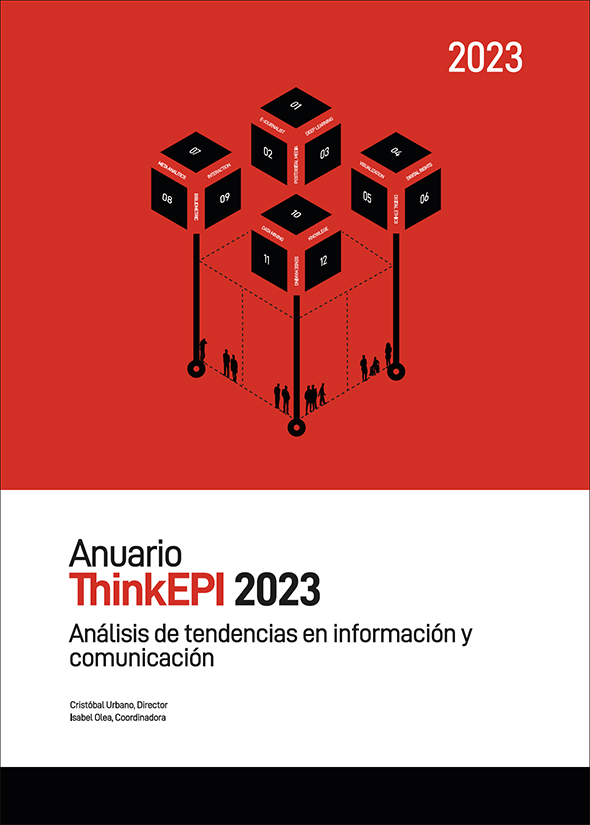Filtros burbuja y gestión personal de los algoritmos
DOI:
https://doi.org/10.3145/thinkepi.2023.e17a10Palabras clave:
Filtros burbuja, Burbujas de filtro, Cámaras de eco, Polarización política, Desinformación, Psicología de la información, Agregadores, Redes sociales, AlgoritmosResumen
Se revisan los principales metaanálisis sobre filtros burbuja y cámaras de eco, y se muestra que hay poca evidencia de la existencia de ambos. Se concluye que, si bien la imagen popular de los filtros burbuja y las cámaras de eco tiene pocos fundamentos, en el futuro se hará necesaria una mayor vigilancia de los ciudadanos ante los posibles efectos de los algoritmos.
Descargas
Citas
Bruns, Axel (2019). Are filter bubbles real? Polity Press.
Dutton, William H (2017). "Fake news, echo chambers and filter bubbles: Underresearched and overhyped". The conversation, 5 mayo. https://theconversation.com/fake-news-echo-chambers-and-filter-bubbles-underresearchedand-overhyped-76688
Eady, Gregory; Nagler, Jonathan; Guess, Andy; Zilinsky, Jan; Tucker, Joshua A. (2019). "How many people live in political bubbles on social media? Evidence from linked survey and Twitter data". SAGE Open. https://doi.org/10.1177/2158244019832705
Graham, David A. (2019). "Some real news about fake news". The Atlantic, 7 enero. https://www.theatlantic.com/ideas/archive/2019/06/fake-news-republicans-democrats/591211
Lardieri, Alexa (2019). "Older people more susceptible to fake news, more likely to share it". U. S. news, 9 enero. https://www.usnews.com/news/politics/articles/2019-01-09/study-older-people-are-more-susceptible-to-fake-news-more-likely-to-share-it
Moeller, Judith (2021). "Filter bubbles and digital echo chambers". In: Tumber, Howard; Waisbord, Silvio. The Routledge companion to media disinformation and populism. Routledge. ISBN: 978 0367435769
Moeller, Judith; Helberger, Natali (2018). Beyond the filter bubble: Concepts, myths, evidence and issues for future debates. University of Amsterdam. https://www.ivir.nl/publicaties/download/Beyond_the_filter_bubble__concepts_myths_evidence_and_issues_for_future_debates.pdf
Oremus, Will (2016). "How many people really get their news from Facebook?". Slate, 20 diciembre. https://slate.com/technology/2016/12/how-many-people-really-get-their-news-from-facebook.html
Oremus, Will (2017). "The filter bubble revisited". Slate, 5 abril. https://slate.com/technology/2017/04/filter-bubbles-revisited-the-internet-may-not-be-driving-political-polarization.html
Pariser, Eli (2017). El Filtro burbuja: cómo la red decide lo que leemos y lo que pensamos. Barcelona: Taurus.
Ross-Arguedas, Amy; Robertson, Craig T.; Fletcher, Richard; Nielsen, Rasmus-Kleis (2022). Echo chambers, filter bubbles, and polarisation: a literature review. Reuters Institute. https://reutersinstitute.politics.ox.ac.uk/echo-chambers-filter-bubbles-and-polarisation-literature-review
Zuiderveen Borgesius, Frederick J.; Trilling, Damian; Moeller, Judith; Bodó, Balázs; De-Vreese, Claes H.; Helberger, Natali (2016). "Should we worry about filter bubbles?". Internet policy review, v. 5, n. 1. https://policyreview.info/articles/analysis/should-we-worry-about-filter-bubbles
Descargas
Publicado
Cómo citar
Dimensions


